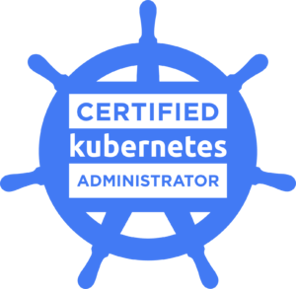If you’ve found this guide, odds are you’re considering taking the CKA exam, or you’ve already been preparing and are looking for final review material. Regardless of which position you find yourself in, here is some advice on how to approach the CKA exam in ways that aren’t included in the excellent killer.sh exams.
About the CKA Exam
The Certified Kubernetes Administrator (CKA) certification was created by The Linux Foundation to develop the Kubernetes ecosystem. Kubernetes admins and other IT professionals take the CKA exam online in a two-hour proctored session. The CKA certification is valid for three years and includes a digital badge.
professionals take the CKA exam online in a two-hour proctored session. The CKA certification is valid for three years and includes a digital badge.
CKA Exam Cost
$395 (USD; sometimes 25% off coupons are available)
Keep an eye out for sales. The Linux Foundation discounts the exam up to 40% off around Black Friday and Sys Admin Day.
The price of the CKA exam includes two practice exams through killer.sh. Don’t forget to take advantage of the opportunity to practice in the simulated exam environment. Taking practice tests is especially important if you’re not paying for an entire course, as they help you understand the format of the test and the areas you’ll need to study.
What to Expect from the CKA Exam
Okay, let's say you have your exam date. You’ve studied, you’ve taken the practice tests, and you’re ready to go. But are you?
Preparing for the testing environment is almost as important as studying the material. Here’s what you should expect from the CKA exam environment.
Connecting to the CKA Exam
You'll be able to connect to the exam portal 30 minutes before your posted exam time for setup. This time should be taken advantage of because it will save your exam time for, well, the exam.
Logging on early will also give you some time to download and get connected to the PSI browser and jump through some of the initial hoops. Even if you access the exam 30 minutes early, you can expect to start after your posted time. Connecting to a proctor and going through the verification process can take some time, but if you’ve already set up your browser, it shouldn’t impact you too much.

Rules for Working Area
Like any proctored exam, the Linux Foundation has rules to prevent cheating. If you’ve never taken a proctored exam online, the rules might be stressful or surprising. However, following the rules is relatively straightforward once you’re aware of the expectations.
-
You are not allowed to have anything physical around you that isn’t transparent. This includes things like waste paper bins and stuff underneath your desk, keyboard, or mouse pad. A clear glass of water with no labels is the only thing allowed besides a mouse and keyboard.
-
You should keep your phone on you at the start of the exam because the proctor will ask you to set it aside in front of them.
-
You are allowed to use a microphone attached to a headset but are not allowed to wear the headset and will have to have it sit around your neck.
-
Keep your photo ID next to you, as you will need to verify that using your webcam before the exam.
-
Ensure you can pick up and move your webcam, as they will require you to pan your room, behind displays, under mousepads, and under your desk.
-
Ensure that your webcam can be positioned in such a way that your typing area and hands are visible
-
PSI Browser
When you connect to the Linux Foundation portal, you must download the PSI Secure Browser. The PSI Browser is somewhat limiting—there is no way to download the browser before the exam. There isn’t a way to check your settings, and things that work in Linux Foundation's online pre-check may not work in the PSI Browser.
Have backup options for everything. This includes hardware devices such as your webcam.
I have only used Windows with the PSI Secure Browser, and while clunky, it was serviceable. I don't personally know if Linux or Mac users will have better luck, but they are supported.
The VM they put you on is fairly slow. Try to work with the default configuration as much as possible, as the performance of the VM slows down any personalization time. Every minute spent trying to tinker with settings to get the environment closer to what you “prefer” is time lost on the exam.
There are plenty of other ways to lose time due to the environment, do not set yourself up for more and get used to a standard environment. The killer.sh tests are a near 1:1 replication of what to expect.
Kubectl tab autocomplete is enabled by default in the VM. Additionally, the alias k = kubectl is bound.
The only environment command I can personally recommend is:export do="--dry-run=client -o yaml"
So that you can use kubectl run pod-name -n namespace $do > pod.yaml or with kubectl create commands.
On the VM itself, since screen real estate is at a premium, I recommend the following:
-
Shrinking the question panel as far to the left as you can
-
collapsing the top bar where the self-webcam feed is
Programs
You should only use four programs while connected to the Remote Desktop:
-
Firefox
-
For accessing kubernetes.io and the Cheat Sheet and other documentation
-
-
Mousepad
-
Ubuntu’s GUI text editor
-
Use for snippets copied from the documentation.
-
-
-
Vi / emacs / nano
-
Use for modifying imperatively generated files.
-
-
Terminal / Command Prompt
-
ALWAYS SWITCH CONTEXT WHEN YOU START A QUESTION
- The exam questions take place over a range of 6 clusters, and you bounce between them frequently over the course of the exam.
- The first command at the beginning of every question, or occasionally in the previous question if they are linked, will change you to the proper cluster.
- The easiest and silliest way to lose marks for correct answers is to accidentally skip changing context to the correct cluster for the question. Right answers in the wrong space will score 0!!
-
Once again: ALWAYS SWITCH CONTEXT WHEN YOU START A QUESTION
-
Copy and Paste on PSI Browser
Copy and paste are so funky on the PSI Browser that they get their own section! As you start the exam, one of the first things you should do is familiarize yourself with how copy-paste works for your setup.
Test this by copying something from the kuberenetes.io documentation into Mousepad, then copy it into a vim/emac editor. You do not want to be futzing with formatting issues the whole exam.
The vast majority of the time, you will have to use ctrl+shift+c/v
According to reports, the hotkey is still ctrl+shift+c/v, even if you’re on Mac. The PSI Browser will not translate Command key presses.
Copying and pasting with regular ctrl+c/v directly into the terminal will add n+1 tabs as individual spaces for every line you copy, i.e., you will paste:
something
like
thisWhich will mess up YAML formatting. To alleviate this, when copying from the documentation, copy it into Mousepad first and make your formatted changes. Then ctrl+shift+v into vim insert mode or your text editor of choice.
If you start the exam and none of the copy-paste options are working correctly, try not to get hung up on it. Just use the mouse right-click context menus to copy and paste. At least you’ll be moving forward instead of getting hung up on the environment.
CKA Exam Proctors
Here’s the thing: Exam proctors are not there to help you with the exam. It’s a harsh truth for some, but understanding it is crucial to your experience. Proctors are there to ensure everyone takes the test fairly.
While you’re taking the CKA exam, time is of the essence. If you are having problems getting started, immediately request a pause using the button in the top-left, then message the proctor with your issue and request support. Doing it the other way around will result in lost test time while talking to the proctor.
Do not expect the proctors to know about the exam environment, and they may not be able to answer technical questions about the PSI Browser or Linux. Proctors have a script to follow for managing the exam. They have no direct support capabilities and will call someone else for troubleshooting.
Some proctors are pickier about the “room environment” view than others. Don’t be surprised if you clear your desk of all literature, and then they ask you to move something in the background. It may seem silly, but don’t let it throw you off.
Knowledge Check
Without going into too much detail, here’s a list of things you’ll want to be familiar with for the CKA exam. This list is non-exhaustive and should not replace formal training or practice exams.
There are core concepts that you will need to know.
-
Basics
-
RBAC
-
PV/PVC
-
Cluster Querying (pods, nodes, stats, services, etc.)
-
Cluster Troubleshooting (pods, daemonsets, services, networking, etc.)
-
-
-
Drain, Upgrade, Restart
-
-
-
This can be tricky due to etcd location.
-
-
-
You might, for instance, have resources in a space and need to configure a network policy that allows pre-existing Pods to communicate.
-
You may need to set Ingress, Egress, or a combination of both.
-
-
DNS Debugging / Network Troubleshooting
-
You should be comfortable using pods to debug Network issues regarding why pods or services cannot communicate.
-
- Container Logging
- You can also view this as a ‘multiple-container pod,’ but there is a specific resource on kubernetes.io for Logging as containers, which is more helpful.
If you’ve gone through this list and are confident in your abilities in most of them, then you should have no issues passing. These are just a subset of topics you might encounter, and there are varieties to each. The killer.sh practice exams are your best resource for more information.
Summary
If you’re new to pursuing the CKA, I hope this blog has given you some direction for specific areas for further study and review. If you’re on the verge of taking the exam, I wish you good luck and hope this has served as a final high-level review before taking the test.
The hardest part of the exam is not answering the questions themselves but more the challenging environment. If you can shake off some of the environmental issues quickly, you should have no issues passing.
Need More Help?
Drop into Bitovi’s Discord Community, and talk to us in the #devops channel!
Need Kubernetes admin training or DevOps Consulting? Bitovi has skilled consultants that can assist with all aspects of your development and DevOps journey. Book a free consultation to discuss DevOps training!
Never miss an update!
Subscribe to the blog 📬




![How to Build a Single-Spa Angular Application [with Code Examples]](https://www.bitovi.com/hs-fs/hubfs/How%20to%20Build%20a%20Single-Spa%20Angular%20Application%20%5Bwith%20Code%20Examples%5D.png?height=117&name=How%20to%20Build%20a%20Single-Spa%20Angular%20Application%20%5Bwith%20Code%20Examples%5D.png)
